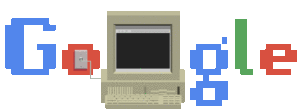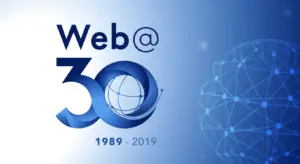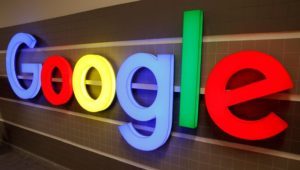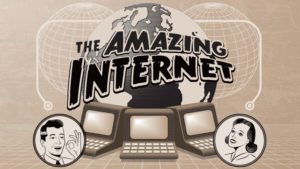
This March, the world celebrates 30 years of a great invention. Today when we use a computer, a smartphone and other similar devices there are many things that we take for granted. Instant communication, music, books, email, pictures, social networks are a fact of life. It was not always like that. Without the genius of a British engineer and computer scientist Tim Berners-Lee and Belgian informatics engineer Robert Cailliau, we probably would not have any of those.
Nowadays, in schools, businesses, libraries, homes, and offices, millions and millions of people use his creation. Berners-Lee’s invention changed the way we communicate, do business, date and in general the way we use information. Berners-Lee is now indelibly associated with three words: World Wide Web (WWW).
In 1989, while working on several projects in a small laboratory of the European Center for Nuclear Research (CERN), located in Geneva, Switzerland, Berners-Lee was faced with the need to distribute and exchange information from groups of geographically dispersed researchers, who also required access to CERN’s available resources. He developed many of the fundamental concepts, now considered web standards, that got the Web started.

– The Uniform Resource Identifier (URI), a universal system for referencing resources on the Web, such as web pages
– The Hypertext Transfer Protocol (HTTP). This protocol specifies how the browser and the server communicate with each other
– The Hypertext Markup Language (HTML), which is used to define the structure and content of hypertext documents
– The Extensible Markup Language (XML). XML is used to describe the structure of text documents.
Robert Cailliau was also a member of CERN. He decided to promote Berners-Lee’s “vague but amazing” idea. Cailliau helped both in the writing and in the provision of resources to finalize the project.
In 1990 CERN published the first page of the World Wide Web project on the Internet.
In April 1993, CERN decided to allow open and free use of the Web by the general public.
In 1994, while working at the Laboratory of Computer Science and Artificial Intelligence of the Massachusetts Institute of Technology (MIT), Berners-Lee founded the World Wide Web Consortium (W3C). This international organization is in charge of the standardization of www technologies.
Four Basic Answers
What is it?
The Web is a hypertext system that uses the Internet as its transport mechanism or from another point of view, it is a system that makes it possible for us to explore the Internet in a graphic way. The World Wide Web is a global computer network accessible through the Internet. It is made up of interconnected web pages that offer different types of textual and multimedia content.
Isn’t It The Same As internet?

People usually refer to “The Web” and “Internet” as if they were exactly the same, when in fact they are not. The Internet is a massive network. So big it is the network of networks. It connects millions of computers around the world through a network that allows any computer to communicate with another no matter they are, as long as they are both connected to the net. When you browse using a connected device you use the internet to access the Web.
What are Hypertexts?
Hypertexts are text files (pages) in which hyperlinks or links can be inserted. These links lead users from one web page to another, or to another point on that same page.
What is a web browser?
A web browser or internet browser is a software tool with a graphical interface, that allows Internet users to navigate or surf between the different pages of their favorite websites. The appearance of National Center for Supercomputer Applications (NCSA)’s first web browser, MOSAIC, marked the official beginning of the Web as a community-oriented system.
Importance and Problems

Today there is little doubt that in just 30 years the Web has changed the world, and us, for good. Knowledge has been made more accessible, democratic and global. The emergence of the World Wide Web has fostered the Internet’s exponential growth. Literally, everybody, from companies and individuals to states, governments, and countries is present on the Internet. Having a foothold in the World Wide Web offers endless opportunities. The younger generations cannot imagine a business or an enterprise without a web page, life without social networks, emails or Wikipedia.
Berners-Lee’s WWW Pitfalls
This growth has not been a bed of roses, though. Berners-Lee himself has pointed out that there have also been situations that are “a threat to society”. He is concerned about the change that his invention has experienced in recent times and that the Web is no longer the open and constructive platform that he imagined when he invented it 30 years ago. The global collaboration, he says, has built the largest network known to man, but has also made it a place full of dangers. Those dangers translate into fake news and above all, into the theft and misuse of information.
Other problems the Web faces today and that affect users are the presence of advertisements, hate speech and false news. Berners-Lee has warned about the “danger of concentration of power” by technology giants such as Google and Facebook.

It is a fact that when we accept the “Terms and Conditions” (that nobody reads) for an app, we are exchanging personal data for free content and at the same time we are losing direct control of our information.
The 2018 Cambridge Analytica – Facebook scandal showed the world how exposed to malicious intentions user’s data is. This British company collected information from millions of Facebook users to supposedly help the campaign of Republican Donald Trump in the US presidential election.
Not only companies but governments are also increasingly tracking our online behavior. With the approval of extreme laws, oppressive regimes could infringe our rights to privacy or prosecute their adversaries.
Another problem is false (fake) news. Internet and the Web are the most important source of information for millions of people. They have accelerated the speed at which stories can travel the world and have magnified their reach.
In this digital environment, money is created with traffic, visits, and clicks. The Internet does not reward good information but the transit and the dissemination of information, whether it is true or false. That means millions of business opportunities. According to Niels Brügger, Professor and Head of the Centre for Internet Studies at Aarhus University, it is normal that “once a technology is made available to users, begin to modify it and develop it to meet new needs”

For some, the end justifies the means and thus they set up business models that use ‘click baits’ to get visits. Fake news spreads significantly faster than real news. Even though It is created with the intention of doing harm or to spread misinformation for financial or political gain, fake news tends to inspire greater surprise and disgust, while real news is more likely to encounter a feeling of sadness, anticipation or confidence.
Some findings indicate that the novelty value of fake news encourages its diffusion. It also seems that anger motivates retweets much more than sadness when reading content.
Berners-Lee has proposed a ‘Magna Carta’ intended to protect user’s rights. “It is essential that those who use the Network know how their data is used.”
– Businesses and large companies need to be more transparent, both internally and externally. “When all purchases are made by computer, the data will be the most important item “,
Berners-Lee points out that these problems could be stopped by new laws and systems that limit the parties’ behavior in the network. “We need cooperation on the web with the government, the civilian population, and elected officials who take decisions and act when the interests of the private sector threaten public goods”.

